#sri lankan parliamentary elections
Explore tagged Tumblr posts
Text
Trying to explain what the fuck just happened in Lankan politics today.
The leftist party has won 159 seats out of 218 in the Parliamentary elections. The single biggest landslide win since we broke from the British and achieved universal franchise in 1948.
Any party achieving a super majority in the executive and legislative is, objectively speaking, bad. It disables checks and balances, which is a catastrophic thing for any democracy, and the only two other times it's happened for us has irrevocably eroded the fabric of civic rights and democratic freedom. Also, the reason the NPP won the North and East is that the colonized, genocided and subjugated people there have no faith in electoralism anymore. The way this government has engaged minority issues has been utterly abysmal and now they've been rewarded for it.
On the other hand:
The winners. Are all. Grassroots. Candidates.¹
We have voted out every single career criminal that's been barnacled into the Lankan political arena since before I've been alive. The fascist party has only three seats.² The other fascists didn't win a single seat. The neoliberal legacy party won none. There are only forty people in Parliament that represent any sort of dynastic political legacy. After 76 solid years of nothing but political dynasties.
This is barely five years after the Rajapaksas swept in and absolutely glutted the Parliament with their family members and cronies end to end.
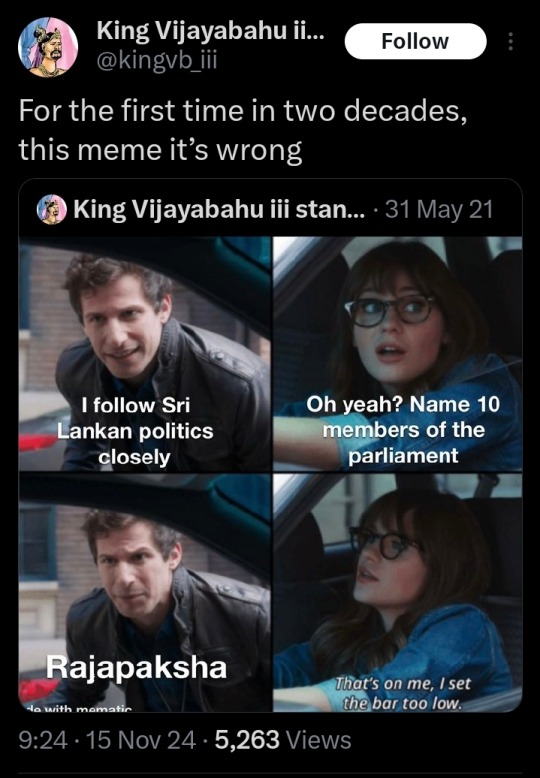
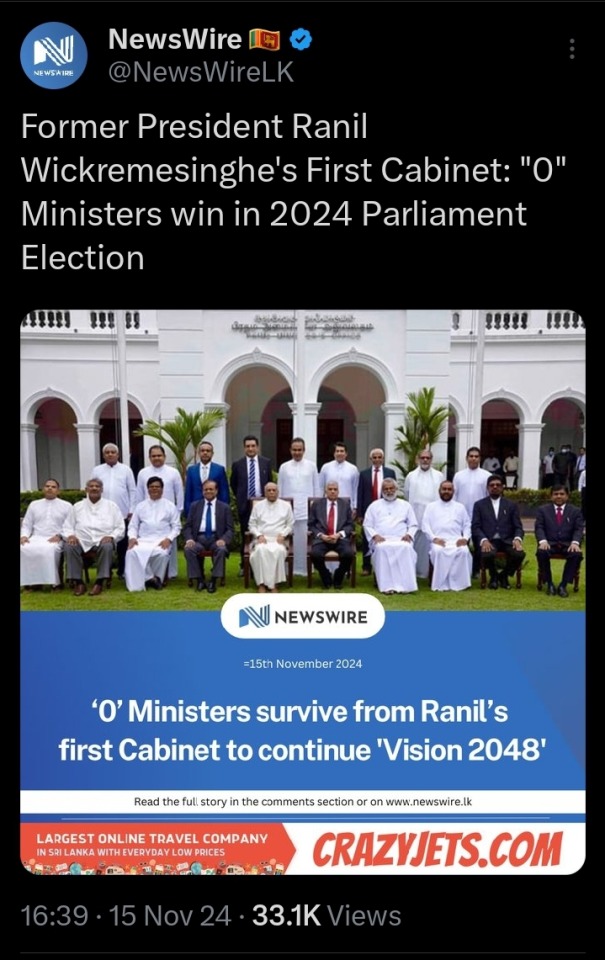
This is the illegitimate interim government we had for most of the last 18 months. We literally, physically, chased the Rajapaksas out of the country and this fucking demon set up a puppet government just so he could finally sit in that goddamn chair and be the despot he'd always dreamed of in exchange for letting them all come back. He's now gone. His entire circle is gone.
THEY ARE ALL FUCKING GONE.
In US terms, just imagine that, five years from now, when Trump's GOP has control of everything, the entire GOP and the worst of the Dems are all purged from Congress and Senate, the Green Party in control of all three branches of government under a pro-union left-wing President and an unmarried female LGBT rights activist Vice President, and the Dems reduced to barely 20% of the House.
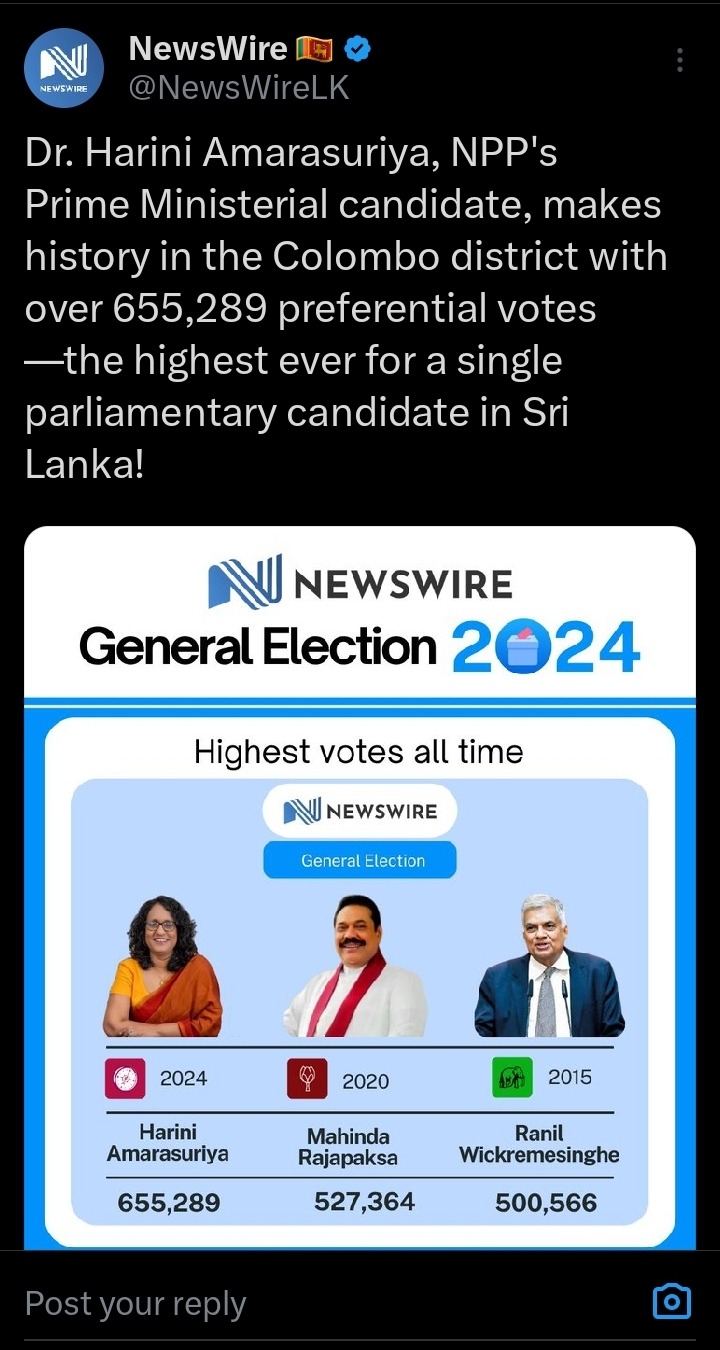
This is my anthropology professor. She joined politics from the small nascent leftist coalition to help keep the government accountable. She's now the Prime Minister and the most popular Parliamentary candidate in the nation's history. (Edit: She was knocked off first place by a dude in the final result. Boo.)
(On the other hand— the woman who helped make me a radical anarchist and literally helped write a book on political dissent and resistance...now is the state. Uh.)
But there are so many women in Parliament! We had the lowest female representation in a South Asian Parliament and some of them were from the list of seats reserved for parties rather than elected ones. Most were either anti-feminist conservative embarrassments, widows and daughters of elite politicians and neoliberal shills. It's still only an increase of a few percentage points (Edit: from the previous 5% to 10% in the final result!) but now we have elected academics, feminist advocates, activists! There Is a representative for Malaiyaha Tamils in the Central Province for the first time in history and it's a young woman! (Edit: now it's two female Malaiyaha MPS!!) This is the plantation community that still live in conditions closest to the slavery the British forced upon them two hundred years ago!
I'm like. Completely mindfucked. To be very very clear, the NPP coalition formed around the nucleus of the JVP that used to be communist but haven't been in 30 years, they're now just social democrats who are left of places like the US and UK, whose "left" is now center-right. They're only threatening to the Western mainstream media for some reason who can't stop bleating about how we have a "Marxist" government now. In reality, the actual chances for radical reform are still quite low, and the opportunity for further erosion is quite high with a super majority government regardless of affiliation.
On the other hand:
What the fuck.
Sometimes living through historical events is really damn amazing.
---
¹ Well, nearly. There are a few career politicians and a nepo baby but they aren't so bad either.
² Goddamn it, Baby Rajapaksa and Sri Lanka's answer to JD Vance have wormed their way in using the list of Constitutionally reserved party seats for non-elected members. FUCK the National List.
#five years ago i was working a news desk watching a band of violent ethnofascists known for genocide torture kidnappings and murder sweep in#and take control of the entire country#on the heels of the worst terrorist attack we've suffered that they orchestrated for this purpose#wondering how many of our colleagues would be safe#and watching the people that opposed them flee the country#i cannot tell you the enraging hopeless terror#and now#they're all gone#THEY'RE FUCKING GONE#sri lanka politics#sri lanka news#sri lanka protests#sri lankan parliamentary elections#sri lanka election 2024#anura kumara dissanayake#harini amarasuriya#feminism#leftism#world news#faith in humanity#power to the people#aragalaya#knee of huss#අරගලයට ජය!#අරගලයට ජය
4K notes
·
View notes
Text
[ad_1] Sri Lankan President Anura Kumara Dissanayake arrived in India on Sunday, embarking on a three-day state visit aimed at enhancing bilateral ties and exploring avenues for deeper cooperation. This marks his first official trip to India since assuming office in September, following Sri Lanka’s recently concluded presidential and parliamentary elections. #WATCH | Delhi: Sri Lankan President Anura Kumara Dissanayake was received by MoS Dr L Murugan as he arrived in New Delhi. This is President Disanayaka’s first bilateral visit to India since he assumed Presidency. pic.twitter.com/7IF8zFdczK — ANI (@ANI) December 15, 2024 President Dissanayake was received in New Delhi with a warm welcome by Union Minister of State for Information and Broadcasting, L Murugan. Speaking about the significance of the visit, Ministry of External Affairs (MEA) spokesperson Randhir Jaiswal emphasized the shared vision of collaboration between the two nations. He described the visit as an opportunity to “deepen ties and add momentum to the people-centric partnership” that defines India-Sri Lanka relations. Warm and special welcome! President @anuradisanayake of Sri Lanka was warmly received by MoS @Murugan_MoS as he arrived in New Delhi. This is President Disanayaka’s first bilateral visit to since he assumed Presidency. An opportunity to further deepen - ties and add… pic.twitter.com/RI3zMBF2aG — Randhir Jaiswal (@MEAIndia) December 15, 2024 During his stay from December 15 to 17, President Dissanayake will hold key discussions with Indian leaders, including President Droupadi Murmu and Prime Minister Narendra Modi. Apart from political engagements, the Sri Lankan leader will also attend business events in the capital, signaling a focus on strengthening economic ties and exploring new trade partnerships. In a statement highlighting the strategic importance of the visit, the MEA described Sri Lanka as India’s closest maritime neighbor in the Indian Ocean Region (IOR). It further underlined the significance of the relationship within the framework of India’s “Neighbourhood First” policy and Prime Minister Modi’s SAGAR initiative, which promotes “Security and Growth for All in the Region.” President Dissanayake’s visit is expected to address key areas of mutual interest, including maritime security, trade, and regional stability. With both nations facing common challenges and opportunities in the region, the visit is poised to strengthen their long-standing partnership and pave the way for greater collaboration in the future. Click here for Latest Fact Checked News On NewsMobile WhatsApp Channel For viral videos and Latest trends subscribe to NewsMobile YouTube Channel and Follow us on Instagram [ad_2] Source link
0 notes
Text
[ad_1] Sri Lankan President Anura Kumara Dissanayake arrived in India on Sunday, embarking on a three-day state visit aimed at enhancing bilateral ties and exploring avenues for deeper cooperation. This marks his first official trip to India since assuming office in September, following Sri Lanka’s recently concluded presidential and parliamentary elections. #WATCH | Delhi: Sri Lankan President Anura Kumara Dissanayake was received by MoS Dr L Murugan as he arrived in New Delhi. This is President Disanayaka’s first bilateral visit to India since he assumed Presidency. pic.twitter.com/7IF8zFdczK — ANI (@ANI) December 15, 2024 President Dissanayake was received in New Delhi with a warm welcome by Union Minister of State for Information and Broadcasting, L Murugan. Speaking about the significance of the visit, Ministry of External Affairs (MEA) spokesperson Randhir Jaiswal emphasized the shared vision of collaboration between the two nations. He described the visit as an opportunity to “deepen ties and add momentum to the people-centric partnership” that defines India-Sri Lanka relations. Warm and special welcome! President @anuradisanayake of Sri Lanka was warmly received by MoS @Murugan_MoS as he arrived in New Delhi. This is President Disanayaka’s first bilateral visit to since he assumed Presidency. An opportunity to further deepen - ties and add… pic.twitter.com/RI3zMBF2aG — Randhir Jaiswal (@MEAIndia) December 15, 2024 During his stay from December 15 to 17, President Dissanayake will hold key discussions with Indian leaders, including President Droupadi Murmu and Prime Minister Narendra Modi. Apart from political engagements, the Sri Lankan leader will also attend business events in the capital, signaling a focus on strengthening economic ties and exploring new trade partnerships. In a statement highlighting the strategic importance of the visit, the MEA described Sri Lanka as India’s closest maritime neighbor in the Indian Ocean Region (IOR). It further underlined the significance of the relationship within the framework of India’s “Neighbourhood First” policy and Prime Minister Modi’s SAGAR initiative, which promotes “Security and Growth for All in the Region.” President Dissanayake’s visit is expected to address key areas of mutual interest, including maritime security, trade, and regional stability. With both nations facing common challenges and opportunities in the region, the visit is poised to strengthen their long-standing partnership and pave the way for greater collaboration in the future. Click here for Latest Fact Checked News On NewsMobile WhatsApp Channel For viral videos and Latest trends subscribe to NewsMobile YouTube Channel and Follow us on Instagram [ad_2] Source link
0 notes
Text
President’s coalition wins majority in Sri Lanka’s snap election
The coalition of Sri Lankan President Anura Kumara Dissanayake’s won a snap general election, giving the country a chance to rebuild after the financial crisis, according to Reuters.
His National People’s Power (NPP) coalition won 137 seats out of 196, a two-thirds majority, according to Friday’s vote count. Dissanayake pledged to adjust the International Monetary Fund (IMF) bailout programme that pulled the country out of the economic crisis.
He soundly won the island’s presidential election in September, but his coalition had just three seats in parliament before Thursday’s snap election, prompting him to dissolve it and seek a new mandate. In Thursday’s election, the NPP won nearly 62 per cent, or almost 7 million votes, compared with the 42 per cent that Dissanayake secured in September
We see this as a critical turning point for Sri Lanka. We expect a mandate to form a strong parliament, and we are confident the people will give us this mandate. There is a change in Sri Lanka’s political culture that started in September, which must continue.
The remaining 29 parliamentary seats would be distributed according to the proportional vote received by each party on the island.
Opposition leader Sajith Premadasa’s Samagi Jana Balawegaya party, Dissanayake’s main rival coalition, won 35 seats. Meanwhile, the New Democratic Front, backed by previous president Ranil Wickremesinghe, gained just three seats.
Normally, the president holds executive power, but Dissanayake still needed a parliamentary majority to appoint a full cabinet and fulfil key promises. Sri Lanka, a country of 22 million people, was crushed by an economic crisis in 2022 caused by a severe foreign exchange shortage that pushed it into sovereign default.
Thanks to a $2.9 billion bailout programme from the IMF, the economy started a cautious recovery. However, the high cost of living remained a critical issue for many, especially the poor.
Investors voiced concern that his willingness to renegotiate IMF bailout terms could delay future disbursements, making it difficult for Sri Lanka to meet a key primary surplus target of 2.3 per cent of GDP in 2025. Raynal Wickremeratne, co-head of research at Softlogic Stockbrokers in Colombo, said:
The country has given a clear mandate politically. The key question would be if this is at the cost of economic policy. I think with this majority they may try to negotiate a bit more on the [IMF] targets as well. A continuation of the current reform programme on a broader extent would be positive for the country.
Read more HERE

#world news#news#world politics#sri lanka#sri lanka election 2024#sri lanka news#anura kumara dissanayake#snap election
0 notes
Text
Landslide win for new Sri Lankan president's left-leaning coalition
The left-leaning alliance of Sri Lanka’s new leader has secured a landslide victory in the country’s snap parliamentary elections. Official results show President Anura Kumara Dissanayake’s National People’s Power (NPP) coalition scored a two-thirds majority in parliament, with 159 seats. President Dissanayake’s coalition got nearly 62% of the vote, winning even in the Tamil-dominated Jaffna…
0 notes
Text
Sri Lankan Leader’s Leftist Coalition Wins Elections
The National People’s Power won a parliamentary election that will allow the country’s new president to unroll his reform agenda, including broader welfare assistance. Source link
0 notes
Text
Sri Lankan Leader’s Leftist Coalition Wins Elections
The National People’s Power won a parliamentary election that will allow the country’s new president to unroll his reform agenda, including broader welfare assistance. source https://www.nytimes.com/2024/11/15/world/asia/sri-lanka-election.html
0 notes
Text
Sri Lanka parliamentary poll: Ruling NPP heading with absolute majority in position.
With more than 70% of the vote, the NPP easily won in Galle, the provincial capital in the south, in the only polling division result that has been made public thus far.

President Anura Kumara Dissanayake’s ruling National People's Power party is expected to win a landslide victory in Thursday's (November 14, 2024) Sri Lankan parliamentary election.
By 6 a.m. local time on Friday, November 15, 2024, the NPP had nearly 62% of the national vote, or more than 4.4 million votes. According to district-based proportional representation, they have won 35 of the 196 seats available.
With more than 70% of the vote, the NPP easily won in Galle, the provincial capital in the south, in the only polling division result that has been made public thus far.
For a simple majority in the 225-member House, the ruling National People's Power [NPP] alliance, which only held three seats in the previous Parliament, needs to secure 113 votes. Up to 196 MPs are chosen directly by voters, while the other 29 members of the House are selected from a "national list" that distributes seats to parties according to their percentage of the vote under Sri Lanka's proportional representation system. Read More…
0 notes
Text
Sri lanka election november ...
"2024 Sri Lanka Election: Make Your Vote Count" —
This November, Sri Lanka stands at a critical juncture as citizens head to the polls to shape the nation’s future. The 2024 election offers a unique chance for Sri Lankans to have a say in the governance and direction of their country. As the nation grapples with both domestic and global challenges, voting empowers individuals to contribute to lasting change and set the course for progress.
The election encompasses several tiers of government, including parliamentary, provincial, and local bodies, where candidates from various parties and independent groups are vying to represent the interests of their communities. Each vote holds the potential to influence key issues such as economic development, healthcare, education, social justice, and national security. Every voter’s choice could play a part in defining policies that support economic resilience, environmental sustainability, and the wellbeing of future generations.
Amid concerns around accountability, transparency, and the pressing need for effective leadership, Sri Lankan citizens are encouraged to vote thoughtfully and responsibly. Whether it's addressing inflation, improving public services, or promoting social cohesion, the leaders elected in 2024 will bear the responsibility to address these priorities.
Participating in the democratic process not only strengthens Sri Lanka's democratic foundation but also fosters a sense of unity and shared purpose among its citizens. By casting their vote, Sri Lankans help shape the nation they wish to see.
.Post your preference👈👈👈👈

0 notes
Text
On this day in Wikipedia: Monday, 15th April
Welcome, merħba, selamat datang, ยินดีต้อนรับ (yin dee dtôn rab) 🤗 What does @Wikipedia say about 15th April through the years 🏛️📜🗓️?

15th April 2022 🗓️ : Death - Henry Plumb, Baron Plumb Henry Plumb, British politician and farmer (b. 1925) "Charles Henry Plumb, Baron Plumb, (27 March 1925 – 15 April 2022) was a British politician and farmer who went into politics as a leader of the National Farmers' Union. He later became active in the Conservative Party and was elected as a Member of the European Parliament (MEP). He served as an MEP..."
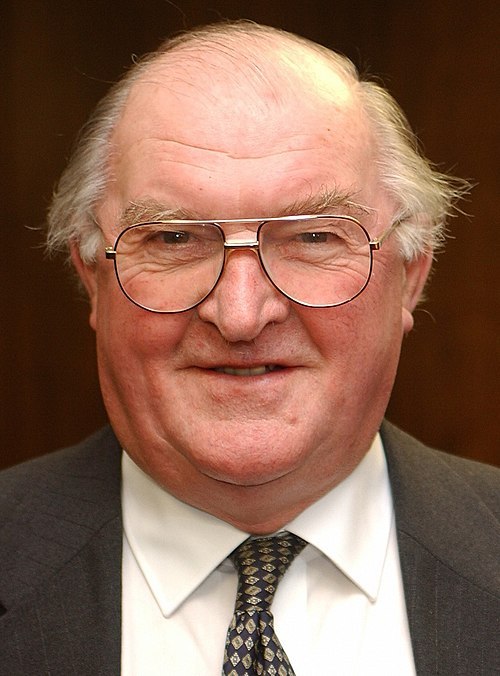
Image licensed under CC BY-SA 4.0? by
History of Modern Biomedicine Research Group
15th April 2019 🗓️ : Event - Notre-Dame fire A fire severely damaged Notre-Dame de Paris, destroying the cathedral's timber spire and much of the roof. "On Monday, 15 April 2019, just before 18:20 CEST, a structural fire broke out in the roof space of Notre-Dame de Paris, a medieval Catholic cathedral in Paris, France. By the time the fire was extinguished, the cathedral's wooden spire (flèche) had collapsed, most of the wooden roof had been..."

Image licensed under CC BY-SA 4.0? by Wandrille de Préville
15th April 2014 🗓️ : Event - 2014 Bentiu massacre In the worst massacre of the South Sudanese Civil War, at least 200 civilians are gunned down after seeking refuge in houses of worship as well as hospitals. "The 2014 Bentiu massacre occurred on 15 April 2014 in the town of Bentiu, in the north of South Sudan, during the South Sudanese Civil War. The attack has been described by The Economist as the "worst massacre" of the civil war. ..."
15th April 1974 🗓️ : Birth - Mike Quinn Mike Quinn, American football player "Michael Patrick Quinn (born April 15, 1974) is a former professional American football quarterback in the National Football League (NFL) for the Pittsburgh Steelers, Indianapolis Colts, Dallas Cowboys, Miami Dolphins, Houston Texans, and Denver Broncos. He also was a member of the Rhein Fire of NFL..."

Image licensed under CC BY-SA 3.0? by Quinn family
15th April 1924 🗓️ : Birth - M. Canagaratnam M. Canagaratnam, Sri Lankan politician (d. 1980) "Mylvaganam Canagaratnam (15 April 1924 – 20 April 1980) was a Sri Lankan Tamil politician and Member of Parliament.Canagaratnam stood as the Tamil United Liberation Front's candidate for Pottuvil at the 1977 parliamentary election. He came second and entered Parliament as the second member for..."
15th April 1817 🗓️ : Event - Thomas Hopkins Gallaudet Thomas Hopkins Gallaudet and Laurent Clerc found the American School for the Deaf (then called the Connecticut Asylum for the Education and Instruction of Deaf and Dumb Persons), the first American school for deaf students, in Hartford, Connecticut. "Thomas Hopkins Gallaudet (December 10, 1787 – September 10, 1851) was an American educator. Along with Laurent Clerc and Mason Cogswell, he co-founded the first permanent institution for the education of the deaf in North America, and he became its first principal. When opened on April 15, 1817, it..."

Image by Unknown photographer more than 70 years after death of photographer
15th April 🗓️ : Holiday - Jackie Robinson Day (United States) "Jackie Robinson Day is a traditional event which occurs annually on April 15 in Major League Baseball (MLB), commemorating and honoring the day Jackie Robinson made his major league debut. Celebrated at MLB ballparks, on that one day, all players, coaches, and managers on both teams, and the..."
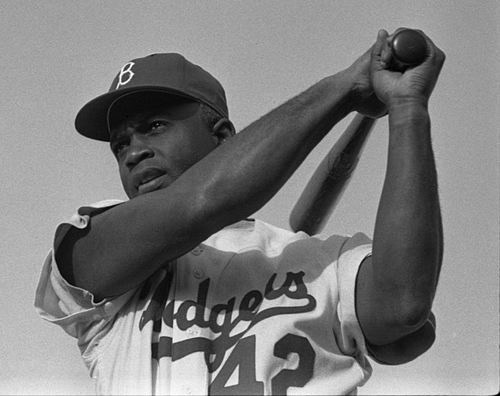
Image by Photo by Bob Sandberg Look photographer
0 notes
Text
Sri Lanka to investigate allegations linking Rajapaksa-backed officials to 2019 Easter bombings
Azad Maulana said he arranged a meeting between IS-inspired extremists and a top intelligence officer to hatch a plot to create insecurity and enable Gotabaya to win the 2019 presidential elections.

COLOMBO: Sri Lanka’s government will appoint a parliamentary committee to investigate allegations made in a British television report that Sri Lankan intelligence had complicity in the 2019 Easter Sunday bombings that killed 269 people. Labor Minister Manusha Nanayakkara told Parliament on Tuesday that details on the investigation will be announced soon.
A man interviewed in the Channel 4 videos released Tuesday said he arranged a meeting between a local Islamic State-inspired group and a top state intelligence official to hatch a plot to create insecurity in Sri Lanka and enable Gotabaya Rajapaksa to win the presidential election later that year.
Azad Maulana was a spokesman for a breakaway group of the Tamil Tiger rebels that later became a pro-state militia and helped the government defeat the rebels and win Sri Lanka’s long civil war in 2009.
Rajapaksa was a top defence official during the war, and his older brother, Mahinda Rajapaksa, had been defeated in the 2015 elections after 10 years in power.
A group of Sri Lankans inspired by the Islamic State group carried out the six near-simultaneous suicide bombings in churches and tourist hotels on April 21, 2019.
The attacks killed 269 people, including worshippers at Easter Sunday services, locals and foreign tourists, and revived memories of frequent bombings during the quarter-century war. Fears over national security enabled Rajapaksa to sweep to power. He was forced to resign last year after mass protests over the country’s worst economic crisis.
In the Channel 4 program, Maulana said he arranged a meeting in 2018 between IS-inspired extremists and a top intelligence officer at the behest of his boss at the time, Sivanesathurai Chandrakanthan, the leader of the rebel splinter group-turned-political party.
Maulana said Chandrakanthan had met the group in prison while in detention on allegations of murder and found they could be useful in creating insecurity in the country.
Maulana told Channel 4 that he himself did not participate in the meeting but that the intelligence officer told him later that creating insecurity was the only way to return the Rajapaksa family to power.
After security camera footage of the bombings was released, Maulana recognized the faces of the attackers carrying bomb-laden backpacks as those whom he had arranged to meet with the intelligence officer, Maulana said in the program. Channel 4 reported that Maulana had been interviewed by UN investigators and European intelligence services over his claims.
Neither Chandrakanthan nor Rajapaksa has commented on the claims.
Pro-Rajapaksa lawmaker Mahindananda Aluthgamage rejected the claims in the documentary.
He told Parliament that Rajapaksa had no reason to set off bombs or use suicide bombers to get elected because public support was already on his side as shown by the result of local elections held in 2018.
0 notes
Text
5 Takeaways From TIME’s Exclusive Interview With Ex-Pakistan Prime Minister Imran Khan
— By Charlie Campbell | April 4, 2023 | Time Magazine
youtube
In late March, TIME spoke with former Pakistan Prime Minister Imran Khan by Zoom from his home in Lahore for a new cover story. Khan was ousted in a parliamentary no-confidence vote last April, and he spent the next year holding rallies to demand snap elections that might bring him back to power.
In the interim, Khan has survived an assassination attempt, been hit with a flurry of charges that he claims are concocted to disqualify him from reentering politics, and narrowly avoided arrest amid pitch battles between police and supporters outside his home in Lahore.
1– Khan Still Believes His Life is in Danger
In November, Khan was shot three times in the leg after a gunman opened fire at his container-mounted truck during a rally, injuring several supporters and killing one. A suspect was arrested at the scene and claimed he was motivated by Khan’s PTI party allegedly playing campaign music during the Islamic call to prayer. But Khan believes three figures in the current government are ultimately responsible. (They all deny the accusation.) Khan tells TIME he had long expected an assassination attempt and fears more may be launched.
“For one and a half months before [my shooting], I was warning that this is what is going to happen,” Khan says. “I told them that they will bump me off and blame a religious fanatic. Because I was in power for three and a half years and, from within the intelligence agencies, they would give me this information. So now, [my supporters] outside [my home] believe that if they arrest me, they will kill me.”


2– The Causes of Pakistan’s Economic Crisis are Structural
Pakistan is locked in a spiraling economic crisis with inflation in March rising a record 47% year-over-year and the rupee plummeting by 54% over the same period. The nation has only $4.6 billion in foreign reserves—$20 per citizen—and avoiding default rests on unlocking a stalled International Monetary Fund bailout. For decades, Pakistan’s economy has relied on foreign cash to balance the books, but the cash has largely dried up since the Trump administration in 2018 halted the $300 million security assistance the U.S. used to provide annually.
“The biggest problem is that we bought far more than we export,” says Khan. “And none of our governments paid any attention to increasing our exports. Whenever your economy starts to grow, the imports increase [and] we run out of dollars. And we end up having to go to IMF. In Pakistan, with a population of 220 million people, there are only about 2.5 million taxpayers. People don’t pay taxes and especially the rich elite.
“We have a huge debt [and] the reason why we can’t service the debt is because you have to create wealth. But what would create wealth is your industry and agriculture; they’re both contracting. There’s no one to invest in Pakistan from outside or within. They have lost all confidence in the government. Our default risk ratio is almost 100%. Our bonds have become worthless, so no-one is willing to lend us money.”
3– Khan Wanted To Use Cricket To Encourage Investment And Develop a Tourism Industry in Pakistan
International test cricket—the most prestigious form of the game—had not been played in Pakistan since 2009, when a terrorist attack on the visiting Sri Lankan team killed six people in Lahore. Under Khan’s premiership, Pakistan hosted Sri Lanka in 2019 for the first test match in the country in a decade. Khan, a former captain of the national cricket team, says the “normalization” of visiting Pakistan was important for reasons bigger than sport.
“Number one is investment,” says Khan. “The more normalized situation you have, the more chances of investment coming into Pakistan. Businessmen were meeting Pakistanis in Dubai; they would refuse to come to Pakistan. So how can you grow an economy in that sort of atmosphere?
“Second is tourism, because Pakistan has huge tourism potential. We have one of the most diverse countries … and we need tourism to get more dollars and offset this current account deficit. So I had planned to open up various tourist resorts, but unfortunately two years of COVID meant that there was hardly any tourism anywhere in the world.”
4– Pakistan Handled The COVID-19 Pandemic Well Because The Government and Military Were Aligned
One of the drivers of last April’s no-confidence vote was Khan losing the backing of Pakistan’s powerful military. He claims it was the generals’ unwillingness to go after influential families for alleged corruption that caused their relationship to fray. However, analysts say that Khan lost the backing of the brass hats after he refused to endorse their choice to lead Pakistan’s intelligence services, known as ISI, because of his close relationship with the incumbent. They also appeared uneasy regarding Khan’s relentless taunting of the U.S., with whom Pakistan’s military is keen to retain friendly ties.
In any case, Khan says that there were occasions during his tenure when the military and government worked well together, such as tackling the COVID-19 pandemic, when Pakistan recorded deaths per capita just a third that of neighboring India. “On some things, like COVID-19, we were all on one page,” says Khan. “So we had their logistics support, because it was all over the country, and they really helped, so we did a great job. But when they, for instance, opposed accountability [for alleged corruption], I couldn’t do anything.”
5– He Still Believes That The U.S. Was Behind His Ouster
Khan tells TIME that Donald Lu, U.S. Assistant Secretary of State for Central and South Asia, warned Pakistan’s Ambassador to the U.S. last March that “there will be consequences” unless he was ousted as prime minister. “The next day, the vote of confidence takes place in the National Assembly,” says Khan. The State Department and White House have repeatedly said there is “absolutely no truth” to Khan’s claims.
0 notes
Text
Sri Lanka votes in parliamentary elections
Sri Lankans are voting in parliamentary elections key to the country’s new president Anura Kumara Dissanayake, according to AP News.
President Dissanayake won the presidential election on 21 September, marking a rejection of traditional political parties. They have governed Sri Lanka since its independence from Britain in 1948.
However, his failure to win more than 50 per cent of the vote heightened concerns about his party’s prospects in Thursday’s election. His party, National People’s Power (NPP), needs a minimum of 113 to control the 225-member parliament.
The biggest challenge for the NPP, founded in 2019, is that many of its candidates are emerging political figures. Of the 225 parliamentary seats, 196 are drawn under Sri Lanka’s proportional-representative electoral system. There are 8,821 candidates contesting for the 196 elected parliamentary seats.
The system allocates the seats in each district to parties according to the share of votes they receive. The remaining 29 seats are allocated to parties and independent groups according to the proportion of votes they receive nationwide.
While campaigning, Dissanayake urged voters to help elect them to parliament so that he would not have to rely on a coalition to implement his promised reforms.
The election comes at a crucial time for the people of Sri Lanka, which is trying to emerge from its worst economic crisis by declaring bankruptcy after defaulting on its foreign debt in 2022. The country is currently in the process of a salvation programme from the International Monetary Fund and debt restructuring to international creditors.
Economic and political crisis
Sri Lanka’s crisis was largely the result of poor economic management combined with the effects of COVID-19. Along with the 2019 terrorist attacks, the pandemic devastated the country’s important tourism industry, also disrupting the flow of remittances from Sri Lankans working abroad.
The economic turmoil led to a political crisis that forced then president Gotabaya Rajapaksa to step down in 2022. Parliament then elected Ranil Wickremesinghe to replace him. However, he lost the election as public discontent grew due to the government’s attempts to increase revenue by raising bills and taxes.
Dissanayake’s promise to punish members of previous governments accused of corruption and return allegedly stolen assets also raised great hopes among the public. Election results are expected on Friday.
Read more HERE

#world news#news#world politics#sri lanka#sri lanka news#sri lanka election 2024#parliamentary elections#anura kumara dissanayake#NPP
0 notes
Text
Sri Lanka: Increasing Suppression of Dissent

Sri Lankan President Gotabaya Rajapaksa at the independence day celebrations in Colombo, February 4, 2020. © 2020 Eranga Jayawardena/AP Photo
The Sri Lankan government of President Gotabaya Rajapaksa is waging a campaign of fear and intimidation against human rights activists, journalists, lawyers, and others challenging government policy, Human Rights Watch said today. The crackdown on dissent under the Rajapaksa administration has intensified in recent months, facilitated by the government’s highly militarized response to the Covid-19 pandemic, and has included intimidation, death threats, physical assaults, and arbitrary arrests. President Rajapaksa’s party secured a parliamentary majority in elections on August 5, 2020. The results increased concerns that the government will exacerbate policies that are hostile to ethnic and religious minorities and further repress those seeking justice for abuses committed during the country’s 26-year civil war, which ended in 2009. The United Nations and governments that have previously called for accountability for past abuses should now call on the Sri Lanka government to stop targeting those pursuing justice. “President Rajapaksa is rapidly turning the clock back to the repression that prevailed during the previous Rajapaksa administration,” said Meenakshi Ganguly, South Asia director. “The Sri Lankan government needs to hear that other countries are watching and will respond to renewed abuses.” The Rajapaksa government has rapidly expanded the role of the military, including by appointing serving and retired officers to previously civilian leadership roles and creating several special “task forces.” The “Presidential Task Force to build a Secure Country, Disciplined, Virtuous, and Lawful Society” is composed entirely of military and police officers and has the power to issue instructions to any government official. Over 30 state agencies, including the police and the nongovernmental organization secretariat (NGO Secretariat), which regulates civil society groups, have been placed under the Defense Ministry. The Defense Ministry has led the government’s response to the Covid-19 pandemic and has failed to uphold the government’s responsibility to ensure that response measures do not target or discriminate against particular religious or ethnic groups. In a little over 2 months, the authorities arrested over 66,000 people for allegedly violating curfew restrictions imposed to control the spread of the novel coronavirus. - Human Rights Watch
1 note
·
View note
Text
"Call Me Dictator": Sri Lanka President Vows To Crush Anti-Government Protests
“Call Me Dictator”: Sri Lanka President Vows To Crush Anti-Government Protests
The next presidential election is scheduled to be held in 2024. (File) Colombo: Sri Lankan President Ranil Wickremesinghe on Wednesday rejected the opposition’s demand for early parliamentary elections and vowed to use the military to crush any future anti-government protests aimed at regime change. Ranil Wickremesinghe, 73, who took over as the President of Sri Lanka in July this year after…

View On WordPress
0 notes
Text
Sri Lankan President Wickremesinghe believes "not right time" for Gotabaya Rajapaksa to return
Sri Lankan President Wickremesinghe believes “not right time” for Gotabaya Rajapaksa to return
Wickremesinghe was elected as the president through a parliamentary vote on July 20 after then-President Rajapaksa fled to the Maldives and then to Singapore when anti-government protesters stormed the President’s House File Photo It is not the right time for Gotabaya Rajapaksa to return to Sri Lanka as his presence here could inflame political tensions in the country which is grappling with…

View On WordPress
0 notes